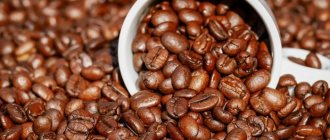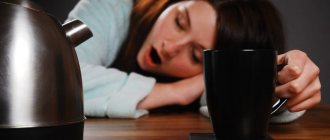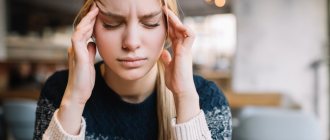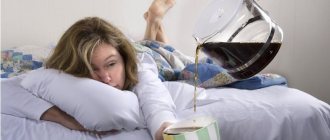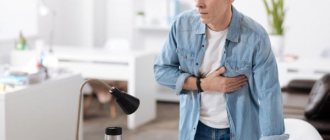Coffee composition
The lower the temperature and duration of roasting coffee beans, the more beneficial properties are preserved. The composition of a drink can be assessed in two categories - its value (nutrients, beneficial microelements) and chemical elements.
Nutritional value (no sugar, cream):
- Fats – 0.7 g;
- Proteins – 0.2 g;
- Carbohydrates – 0.15 g;
- Vitamin PP – 0.5 g;
- Potassium – 0.5-0.9 g;
- Phosphorus – 7 mg;
- Calcium – 5 mg;
- Iron 2-3 mg.
Coffee is low-calorie, with no more than 9 kcal per cup. But on the other hand, it can replenish 20% of the daily requirement of vitamin PP and is a rich source of potassium.
The chemical composition contains over one and a half thousand different elements. Of these, less than half have been studied so far, so coffee will remain an object of research for a long time.
Due to roasting, beans lose a quarter of their moisture; during processing, most of the lipids are lost.
What does it consist of:
- Sucrose, fructose, galactose;
- Organic acids - malic, pyruvic, acetic, caffeic, oxalic, citric;
- Essential oils. They have an antiseptic effect and add aroma;
- Caffeine;
- Trigonelline. Responsible for the richness of taste and pleasant smell;
- Cafeol.
Expired coffee: “you can’t throw away the drink”
The expiration date on any product is indicated to determine the shelf life of its quality characteristics. For coffee, expiration of the expiration date always means a loss of taste and aromatic properties, but such a drink will not cause harm. Expired coffee in any form contains much less caffeine, which negates not only the taste and smell, but also its tonic qualities. Depending on the way the product is packaged and the degree of expiration, it can be restored to its lost characteristics.
- Expired green coffee can be consumed. The taste and smell can really be restored by roasting and grinding. Such a drink will not cause harm to the body.
- Roasted coffee beans in sealed or vacuum packaging are not harmful if the expiration date is relatively recent. Then it will lose some of its taste properties. But if the beans have an uncharacteristic greasy sheen, are too dark, and have a rancid smell, the product should be thrown away: it will not be possible to revive it, and you may feel sick from such coffee.
- Ground expired coffee in a closed package may not lose its quality much longer than the indicated expiration date, but the older it gets, the more tasteless the drink made from such coffee will be. An opened pack expires even faster: within a month it loses 90% of its properties.
- Expired instant coffee loses its taste more slowly due to chemical components (flavors, dyes, preservatives, enhancers): an airtight jar can be opened even after 3 years of storage. However, after 2 months the opened product will lose its smell and taste, turning into a “coffee drink”.
The benefits and harms of coffee
It provides great benefits with its antioxidants and minerals. But when overdosed, coffee causes no less harm than when it is consumed for contraindications.
Three to five leads to:
- Depression;
- Fatigue;
- Drowsiness;
- Sudden mood swings;
- Irritability and aggression.
Coffee constantly stimulates the nervous system, keeps it in tension, which causes it to become exhausted.
The drink does not replenish fluid deficiency, but serves as a diuretic that dehydrates. Therefore, after a cup of coffee it is customary to drink one or two glasses of water.
If you do not have heart problems, then it will not harm you in any way. The only short-term effect of the drink is an increase in blood pressure, which almost immediately returns to normal.
It greatly affects the functioning of the gastrointestinal tract, increasing the level of acidity in the stomach; an overdose of coffee can cause the development of peptic ulcers and gastritis. Doctors and nutritionists all unanimously say that drinking it on an empty stomach is not recommended.
Coffee contraindications:
- For cardiovascular diseases;
- For nervous disorders and mental disorders;
- In old age and childhood;
- During pregnancy.
Benefit:
- Mitigation of asthma attacks, allergies;
- Helps get rid of toxins, improves the condition of patients who are rehabilitating from alcohol and drug intoxication;
- Decreased blood pressure;
- Increased brain activity, increased performance;
- Reduces the risk of Alzheimer's disease;
- Prevents the development of ovarian cancer in females;
- Reduces the risk of liver disease and oral cancer.
The ambiguity of the drink raises the question - is it possible to die from it? Yes, if the daily intake of caffeine is 10 grams, which is contained in 5-30 liters of drink.
Effect of coffee on the body
Coffee, like any product consumed in reasonable quantities, is not harmful to the body. If you drink no more than 2 small cups a day, without making the drink too rich, you may notice an improvement in your well-being.
Drinking coffee daily has the following positive effects:
- The drink is a good preventative against diseases of the intestines, liver and cardiovascular system.
- In the female body, there is an increased production of endorphins, due to which the fair sex feels a surge of strength, vigor and happiness.
- Metabolism accelerates and brain nutrition improves.
- Coffee helps fight the occurrence of atherosclerosis and prevents the appearance of gallstones.
- Vasospasm goes away, which has a beneficial effect on patients suffering from regular headaches.
- Muscle tone increases and the production of certain hormones increases.
- By accelerating blood circulation, mental activity increases, and it becomes easier for a person to perform various intellectual tasks.
- By increasing the production of gastric juice, digestive processes are improved.
However, it is important to remember that in order to achieve all of the above positive changes, the amount of coffee drunk daily must be strictly dosed.
No less important is the quality of the product: preference should be given to coffee beans; instant coffee has virtually no beneficial substances left after processing.
What dose is safe?
Scientists were unable to establish the exact norm. Everything is conditional - the type of roasting of coffee beans, the type (ground, instant), the individual characteristics of a person - force it to constantly change.
But there are conditional limits. An overdose can occur due to the use of 25 servings of natural and 15 servings of instant. In this case, the amount of caffeine received by the body per day should exceed 100-150 mg of caffeine.
But it is best to limit yourself to 1-3 servings, which will not harm the body due to the high caffeine content.
What happens if you drink a lot of coffee at once?
After drinking too much coffee once, a person begins to feel strange. The sensations are unpleasant and are associated with the accumulation of caffeine in the body. The action of the biostimulant begins approximately 15 minutes after drinking the drink. The peak is reached after forty minutes to an hour, and then begins to slowly subside.
It will take 4 to 6 hours for the caffeine resulting from drinking one cup of coffee to be completely neutralized. The interval between consumption of the drink should be at least 4 hours. What happens if you drink too much coffee in a row? There will definitely be an accumulation of excessive amounts of caffeine in the body, that is, an overdose.
Symptoms of coffee overdose
Symptoms of coffee overdose are conventionally divided into three phases: early, late, acute.
A deterioration in well-being is noticed within 10-20 minutes after drinking the drink - these are early signs, they indicate that the substances have not yet had time to be absorbed by the intestines and spread through the blood.
It is necessary to act immediately before the late or acute phase occurs. If this happens, call 911 immediately.
Early phase symptoms:
- A rush of blood to the skin causes severe redness of the face;
- Adrenaline increases excitability - all secretions work in enhanced mode. Manifests itself in the form of – excessive sweating, shine in the whites of the eyes;
- Getting hot;
- Trembling is observed in the arms, legs, fingertips, and sometimes throughout the whole body;
- The heart rate increases - this is also the influence of adrenaline and norepinephrine;
- Severe or mild dizziness.
Signs of the late phase:
- Nausea;
- Sweating becomes even more severe;
- Frequent urge to go to the toilet due to intense stimulation of urinary function;
- Disorders of the digestive tract - abdominal pain and cramps, intestinal colic.
Symptoms of the acute phase do not indicate excessive consumption of the drink, but intoxication. It is impossible to do without qualified medical care.
How does the acute phase manifest:
- Insomnia due to nervous disorder
- Nervousness, irritability, the main reason for which is a strong jump in adrenaline in the blood;
- Change in skin tone. It acquires a shade of blue first under the eyes, near the nose;
- Shortness of breath, suffocation;
- Hallucinations, mental confusion. Due to the large amount of adrenaline and norepinephrine, the brain does not perceive reality, distorting it;
- Attacks of headache, high temperature.
Nausea after drinking a drink
If you feel nauseous after drinking coffee, it is impossible to reliably pinpoint the only source of the problem. Typically, this symptom appears for one of the following reasons:
- Beverage abuse . In case of an overdose, nausea from coffee occurs as the body's response to excess toxins. The reason for this reaction is dehydration due to the large expenditure of fluid to eliminate the toxin (that is, nausea is associated with a lack of water).
- Often sick from coffee due to irritation of the gastrointestinal mucosa , when a person is on the verge of an ulcer or gastritis. In this condition, gastric juice irritates the walls of the stomach, which leads to vomiting. This reaction is also noticeable when drinking on an empty stomach.
- In diseases of the cardiovascular system, the symptom may be a consequence of increased blood pressure. Caffeine provokes additional release of adrenaline and dopamine, accelerating the heartbeat and breathing - blood pressure increases, which is accompanied by nausea, dizziness and weakness.
- Another substance whose production is stimulated by caffeine is cartisol, a stress hormone. Anxiety in heavy coffee drinkers can cause nausea.
- Sometimes vomiting after drinking coffee is associated with the body's individual reaction to the substance. Intolerance usually affects pregnant women and women at certain stages of the menstrual cycle.
- In the modern market, it is not uncommon for nausea to be associated with poor product quality . For example, instant coffee consists of 80% chemical additives, and the inscription “100% Arabica” is just an advertising ploy.
- Nausea may be caused by the calorie content of the drink . If it contains nutritional toppings or full-fat milk, the body may react in a similar way.
Coffee overdose: first aid and treatment
What to do in case of a coffee overdose - sometimes in case of poisoning you can get by with first aid at home.
If all signs of acute intoxication are observed, you need to call a doctor and carry out an emergency measure before his arrival.
How to help the victim:
- Rinse your stomach. After every liter of liquid you drink, artificially induce vomiting;
- Give a sorbent - “Activated carbon”, “Smecta”, “Polysorb”;
- Constantly replenish fluids. Every half hour, drink a quarter glass of clean water;
- If a person is chilling, wrap them up tightly; if the temperature is above 38 degrees, bring it down by wiping with a damp towel.
Is it possible to drink instant coffee while losing weight?
Many diets allow the consumption of instant coffee due to its low calorie content. Indeed, if you drink black coffee without milk and sugar, then its calorie content is less than 3 kcal per mug, which is a very low figure.
Another question is that in addition to extra calories, you won’t be able to get any nutrients or a boost of energy from such coffee.
Caffeine and sodium benzoate poisoning
Some types of instant, packaged coffee do not use pure caffeine, but caffeine sodium benzoate. Its daily dose should not exceed 300 mg, otherwise you may suffer from intoxication.
Many people are interested in what to do in case of such poisoning - everything is the same as in case of intoxication with a drink with pure caffeine.
During use, it is recommended to avoid a number of drugs -
- "Norfloxacin"
- "Cimetidine"
- "Ciprofloxacin"
Regular alcohol abuse
We told you what symptoms appear if you drink a lot of coffee. What will happen to the body if you constantly “sit” on this aromatic drink? Many people really don’t understand that the body is in danger, and drink several mugs of coffee a day, pouring a new one almost as soon as the previous one runs out.
If you abuse caffeine daily, the central nervous system will be overloaded to the limit. The body will begin to work in a constant state of stress, and stable stimulation of hormone production (adrenaline, dopamine and serotonin) will lead to exhaustion of the nervous system.
In most cases, regular coffee abuse leads to addiction, when a cup of the drink is simply necessary, not to cheer you up, but to feel “good.”
What happens if you drink a lot of coffee consistently? The body's reaction to the drink will be the opposite of what it should be with moderate consumption.
Can I drink instant coffee during pregnancy?
Pregnant women and nursing mothers are strictly prohibited from consuming granulated coffee. In the first case, the likelihood of abnormal development of the fetus increases significantly, and the risk of miscarriage also increases.
As for nursing mothers, their consumption of unnatural coffee often leads to nervousness and psycho-emotional disorders in the child.
It is also recommended to avoid instant coffee:
- To old people.
This age group has a high chance of worsening sleep problems and developing tachycardia.
- Drivers.
Most often, drivers drink coffee to cheer themselves up. The instant drink contains too little caffeine, so it cannot effectively energize you, which means you are more likely to fall asleep while driving.
- For children.
The child’s overly active body reacts to caffeine by increasing nervousness, excitability and aggressiveness.

